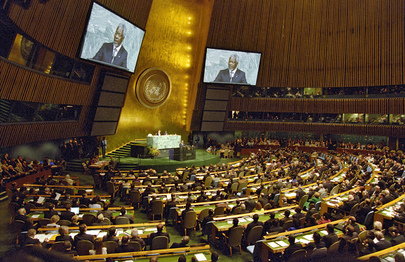Afghanistan: Lifesaving services cut as Taliban bars women aid workers
The UN’s relief effort for Afghan earthquake victims continued on Friday, although essential services have been cut for operational reasons, following reinforced Taliban restrictions on women working with the global body.
The development comes a day after the UN Mission in Afghanistan urged the de facto Taliban authorities to lift restrictions barring women national staff from entering United Nations premises.
Arafat Jamal from the UN refugee agency, UNHCR, said that vital support centres could not operate without women, as it’s their job to process the women and girls now returning to Afghanistan in their thousands from Iran, Pakistan and elsewhere.
“These centres are essential to distribute the initial cash that people receive, to register people biometric and to provide protection, screening and interviews. This work is entirely impossible without Afghan female workers because the experience of biometrics is a very tactile one, the interviews are often confidential and 52 per cent of returnees are women.”
Since the start of the year, some 2.6 million Afghans have returned from neighbouring countries.
The pace of returns has continued to surge, with nearly 100,000 people crossing back from Pakistan in the first week of September alone, “stretching our capacities and the capacities of this country to the limit”, UNHCR’s Mr. Jamal said.
Sudan: As children’s suffering deepens, school remains a distant hope
Aid agencies working in war-torn Sudan issued an alert on Friday over the particular harm faced by children there, the longer the conflict goes on.
After more than two years of civil war, more than 25 million people are now acutely hungry and at least 20 million require health services urgently.
The development comes as the UN World Food Programme (WFP) said that for the first time, funding shortfalls have forced it to pull back support in areas where it does not have access.
“The scale of needs in Sudan are so big that we have to make tough decisions on who receives assistance and who doesn’t. These are heartbreaking decisions to make. Some of our warehouses across the country are now empty because of the lack of resources and health outbreaks. We urgently need more support from the international community to continue stepping up for the people of Sudan.”
Education is another victim of the war, with around 13 million of the 17 million youngsters remaining in Sudan now out of school, according to the UN population fund, UNFPA.
DPRK: Human rights situation has not improved in 10 years, says OHCHR
To the Democratic People’s Republic of Korea – DPRK – where credible testimonies indicate that thousands of street children are working in coal mines, just one of a number of alleged grave abuses, according to the UN human rights office, OHCHR.
In a new report, OHCHR insists that the situation in DPRK has not improved over the past decade, and that in many instances, it has worsened, “bringing even more suffering” to the country’s people.
With more, here’s OHCHR spokesperson Liz Throssell:
“The report, which is based on hundreds of interviews by the Office along with supporting materials, points to the increased use of forced labour in many forms, particularly so-called ‘shock brigades’, usually deployed to take on physically demanding and hazardous sectors such as mining and construction. They often come from poorer families and in recent years, the Government has used thousands of orphans and street children in coal mines and at other hazardous sites and for extensive hours.”
The UN report details the introduction of more laws, policies and practices that are subjecting citizens to increased surveillance and control.
It notes that political prison camps continue to operate, while OHCHR also cited credible evidence that individuals have been executed for distributing foreign media including K-dramas.
Daniel Johnson, UN News
Source of original article: United Nations (news.un.org). Photo credit: UN. The content of this article does not necessarily reflect the views or opinion of Global Diaspora News (www.globaldiasporanews.com).
To submit your press release: (https://www.globaldiasporanews.com/pr).
To advertise on Global Diaspora News: (www.globaldiasporanews.com/ads).
Sign up to Global Diaspora News newsletter (https://www.globaldiasporanews.com/newsletter/) to start receiving updates and opportunities directly in your email inbox for free.
































